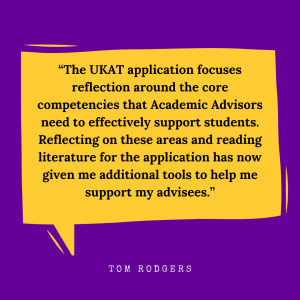How recognition through UKAT can enhance academic advising

“The UKAT application focuses reflection around the core competencies that Academic Advisors need to effectively support students. Reflecting on these areas and reading literature for the application has now given me additional tools to help me support my advisees.” – Tom Rodgers
What prompted you to go for professional recognition of your advising practice?
Evidence suggests, when done well, academic advising enhances the student experience, improves academic success, encourages students to prepare for employment, and promotes a sense of belonging . The literature shows that advisors who are proactive and meet regularly with their advisees, especially at the start of their course, are likely to be successful in supporting students to extend their conceptions of learning, improve their study skills, and communicate more effectively with academics .
It is very important to for us as staff to reflect on these academic advising activities and it is also important to keep up to date on best practice for student support. This is sometimes difficult due to time constraints and other priorities. Applying for recognition through UKAT provided good motivation to do both activities, whilst gaining national recognition for activities that I have led at Manchester.
You are now a Recognised Senior Advisor (RSA). How did you decide which level of recognition to go for?
UKAT offers three levels of recognition. The first is the Recognised Practitioner in Advising (RPA), aimed at academic advisors who demonstrate individual understanding and application of a broad range of effective approaches in delivering student support. The second is the Recognised Senior Advisor (RSA), aimed at those with responsibilities for leading and developing others in the implementation and delivery of effective academic advising practices. The third level is the Recognised Leader in Advising (RLA), aimed at highly experienced advisors who can demonstrate impact in advising policy leadership at an institutional, national, or international level.
I applied for the Recognised Senior Advisor level as, while I was the deputy undergraduate Programme Director and the discipline Head of Education, I developed a new Blackboard resource to support our students within the department linked to our academic advising sessions. I also created some sessions to support the department’s Academic Advisors, discussing topics around building empathetic relationships and campus resources.
Do you have any reflections from the UKAT application which have influenced your practice?
The UKAT application is based around their professional framework that sets out the core competencies that Academic Advisors need to effectively support student success. The advantage of this is that it structures your reflection into key areas.
When I first started as an Academic Advisor, I found that getting students to think through their problem and to get them to plan was difficult. I found that using some models from the literature for this greatly supported my practice, e.g., Egan’s Skilled Helper Model . Reflecting on this for the application allowed me to improve on the use of this model with students, helping my students understand their problems and to think about how they can solve them for themselves.
The reflection for this application has helped me think about the importance of being proactive and contacting my students and make sure I engage with them to attend advising sessions. I make sure to set clear expectations with my advisees, so they know that I can support them, but that I will signpost them to other services and support resources across the university
Further reading/resources:
References:
-
Thomas, C. (2017). Academic advising and institutional success. Academic Advising Today, 40(1), https://nacada.ksu.edu/Resources/Academic-Advising-Today/View-Articles/Academic-Advising-and-Institutional-Success.aspx
-
Yale, A. T. (2019) The personal tutor–student relationship: student expectations and experiences of personal tutoring in higher education, Journal of Further and Higher Education, 43:4, 533-544.
-
Egan, G. (2014) The Skilled Helper: A Problem Management and Opportunity Development Approach to Helping, Brooks/Cole Cengage Learning, Pacific Grove.







0 Comments